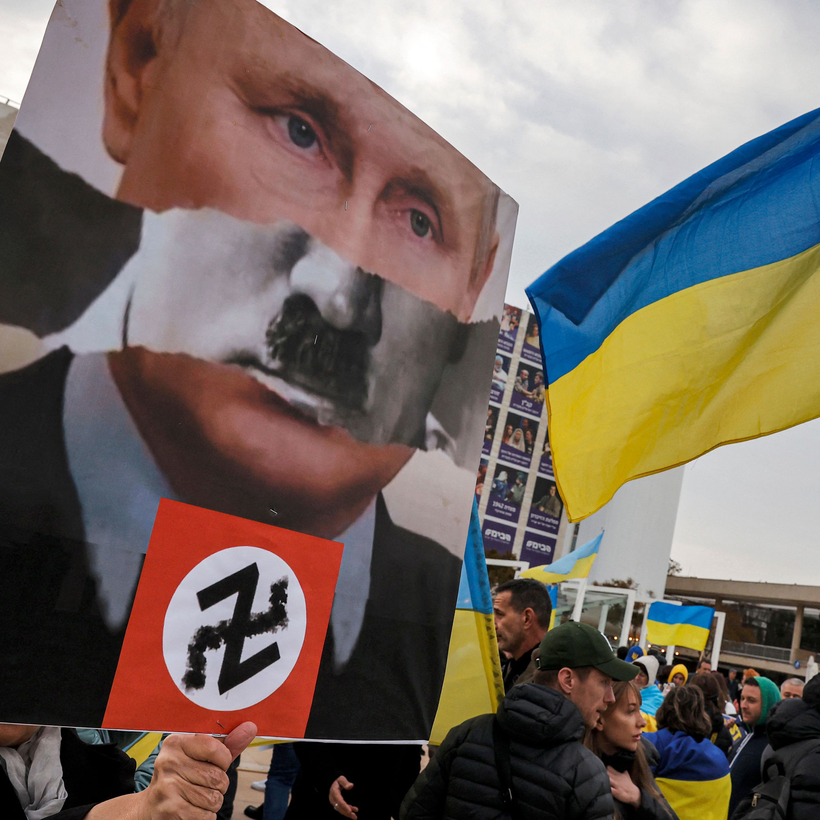As Russian rulers go, Vladimir Putin was for a long time remarkably un-anti-Semitic. He mingled with Jewish community leaders, lit Hanukkah candles, and, in 2007, the Russian leader even donated a month’s salary toward the construction of the Jewish Museum and Tolerance Center in Moscow—a Ralph Appelbaum–designed venue showcasing the history of the Russian Jews.
Putin spent his childhood with Jewish friends whom he credited with keeping him out of trouble; and he’s always spoken favorably of the Jewish community.
Under Putin, Russian-Israeli relations were cordial and mutually beneficial, and the two countries were often tolerant of each other’s shortcomings.

“In one of our meetings with Putin, he told me that the hostile Soviet policy toward Jewish communities was a mistake, that these communities are one of the bridges between Russia and the West,” says Natan Sharansky, the chairman of the Institute for the Study of Global Antisemitism and Policy, who spent nine years in Soviet prisons as a refusenik before moving to Israel and becoming a politician.
However, being in Putin’s good graces only works if you’re not standing between him and his bloody vision of a new Russia. The inevitable happened: they finally came for the Jews.
Sokhnut, the Jewish Agency for Israel, was already under increased scrutiny by Russian authorities. For the past three years, Sokhnut’s regional branches endured numerous inspections and were slapped with hefty fines, all of which the agency paid.
The inevitable happened: they finally came for the Jews.
“After Russia annexed Crimea, a slew of laws concerning the use of Russian citizens’ data by foreign organizations was enacted, threatening Sokhnut’s ability to conduct business,” says Sharansky, who was head of the Jewish Agency for Israel from 2009 to 2018.
But on July 15, the Russian Ministry of Justice, going beyond simply harassing the organization, ordered Sokhnut to shut down. The formal pretext was that Sokhnut kept sending Russian citizens’ data abroad, which caused the organization to fall under the ever expanding definition of a national-security threat.
In short, Russian authorities are saying that Sokhnut can’t collect Russian citizens’ data, which is at the core of the agency’s operation, as they need this data to help people leave. If the agency complies, they won’t be able to work, and if they don’t, they’ll be shut down.
And while, so far, the effort to shut down Sokhnut is considered mainly a matter of Russian-Israeli diplomacy (negotiations to keep it going stalled this week) and, to a more significant extent, the consequences of Russia’s invasion of Ukraine, the history of Russian anti-Semitism tells us that the moment people on the streets feel that the Kremlin has changed its stance on Jews, they’re going to follow suit.
In a somewhat unusual interpretation of Russian law, the Ministry of Justice regarded the fact that the Jewish Agency paid imposed fines as an “admission of guilt,” a clear sign that Sokhnut’s days were numbered. Add to that Russia’s growing ties with Iran, the state’s media campaign against well-known writers, actors, and artists who left because of the war—many of them to Israel—and, needless to say, the Russian foreign minister’s recent remarks about Hitler having “Jewish blood,” and you have a picture of Russia that’s increasingly hostile toward Jews.
The history of Russian anti-Semitism tells us that the moment people on the streets feel that the Kremlin has changed its stance on Jews, they’re going to follow suit.
One interpretation for the shutdown of Sokhnut is that the F.S.B., Russia’s fearsome security service, is trying to stop the catastrophic brain drain that’s been going on since Russia invaded Ukraine. The Jewish Agency has been getting about 1,000 applications a day since the hostilities started, a dramatic increase. Many applicants are educated young people whose departure will hurt Russia’s STEM potential for years to come.
Unsurprisingly, the F.S.B. invites those leaving Russia for a “talk” on the sidelines of passport control. The questions are simple: Do you work in I.T.? What’s your opinion on the war? And: Are you planning to come back?
“People on the fence about moving to Israel have noticeably stepped up their efforts to leave. Those who haven’t even thought about repatriation are actively researching the possibility of going to Israel,” says Avigdor Nosikov, a rabbi from Voronezh who, like many others, left Russia shortly after the war began.

A telling advertising campaign to convince the tech crowd to remain has popped up in and around airports. In a widely circulated video, a heavily accented Russian voice lists “beautiful women, cheap gas, and traditional values” as reasons to move to Russia, with stock footage of white people in white clothes running across fields of white flowers to prove it. What Jew would ever want to leave Russia after that?
The F.S.B., Russia’s fearsome security service, is trying to stop the catastrophic brain drain that’s been going on since Russia invaded Ukraine.
Then there’s the question of Russian-Israeli relations. Israel has remained one of the few countries to refrain from sanctioning Russia, even though it condemned the invasion. Israel sent no military assistance to Ukraine, providing only humanitarian aid, such as medical supplies and building a field hospital. Israeli public opinion is pro-Ukraine, but there’s the matter of delicate agreements between Tel Aviv and Moscow concerning Syria. So far, Israeli Air Force warplanes were allowed to breach Syrian airspace and target caravans with Iranian weapons headed to Lebanon without the risk of being shot down by Russian air defenses, a vital matter of national security for the Jewish state.
The idea behind the agreement and Israel’s particular stance toward the war in Ukraine is that being on good terms with Russia will limit the damage from some of Israel’s adversaries, who happen to be Russia’s newfound allies. But Putin’s view of international relations has long boiled down to countries being either friends or foes of Russia, and Israel—with the condemnation of the Russian invasion of Ukraine and the field hospital—was filed under “foe.”
“Russia is actively searching for ways to break through the economic blockade, using everything at its disposal. For Germany, it’s cutting off energy supplies; for Israel, it’s the Jewish Agency. I don’t think they’re going to close Sokhnut; they’re going to keep ramping up the pressure because, for them, the threat is more important than the execution,” says Sharansky.
Sharansky remembers how he confronted the Russian authorities a few years back, asking them bluntly: Do we have anything to worry about? “I was told that for as long as our Russian-Israeli relationship is good, you can keep working. Since then, the relationship between our countries soured; I was waiting for Sokhnut to become a target.”
Russia’s plunge into hard-core nationalism, its embrace of Iran, the alarming anti-Semitic rhetoric coming from the very top, and now a ban on the Jewish Agency are all signs of a tide that has turned into something all too familiar for Russian Jews—a feeling that their welcome is running out.
Alex Yakobson, a professor of history at the Hebrew University of Jerusalem, notes that “the rise of Russian nationalism naturally implies at least the threat of anti-Semitism.... The closure of Sokhnut will cause a spike in Jewish emigration from Russia, with people thinking it might be their last chance to get out.”
As one of my (former) Kremlin friends who was comfortable with invading Ukraine put it, “The moment the old man goes after the Jews, all bets are off. Nobody knows what happens after that.”
Andrew Ryvkin is a Russian journalist and screenwriter who was forced to emigrate after Putin’s invasion of Ukraine


